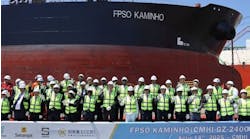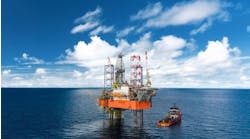Africa
In February, Eni SpA unit Agip Energy, started production at the Okono field offshore Nigeria after signing a contract with the Nigerian Petroleum Development Company (NPDC) a year earlier.
The Okono Field is scheduled to reach a production level of 25,000 b/d by mid-year, with a total production of 50 MMbbl. The field is located in 65 meters water depth. Okono production is to be followed by production from the neighboring Okpoho Field, where development is underway. Okpoho is scheduled to begin producing by the end of next year. Eni expects cumulative production from the two fields to reach 50,000 b/d.
Early this year, Amerada Hess announced another significant oil discovery in the Rio Muni Basin offshore Equatorial Guinea. The Ebano discovery is in Block F in 2,052 ft water depth.
The well is about 10 miles northeast of Amerada's Ceiba Field and encountered reservoirs similar in quality to those in Ceiba, Okume, and Oveng. This marks Amerada Hess's third successive find in the area. The company plans to spud an exploration well in Block G, three miles southeast of the Ebano discovery.
Amerada Hess operates both blocks with 85% interest. South Africa's Energy Africa Ltd. holds the remaining 15%.
Americas
Unable to satisfactorily resolve a boundary dispute in the offshore, Guyana and Suri- name are now considering a joint venture for oil and gas exploration.
A joint statement issued by Suriname's Presi-dent Ronald Venetiaan and Guyana's President Bharat Jagdeo indicates that the countries have begun laying the groundwork for a possible agreement. Additional negotiations are scheduled to take place in May.
If the countries can reach an understanding, exploration activities can begin to uncover the estimated 15 bbl reserves that, according to the US Geological Survey, lie under the two countries' coastal region.
Asia/Pacific
At the end of January, Technip-Coflexip announced that it had been awarded its first contract by Brunei Shell Petroleum for the Egret Phase 1 Gas Development Project, offshore Brunei. Technip-Coflexip will be responsible for project management, engineering, procurement, and fabrication of a 15-km subsea cable, a 25-km, 20-in. multi-phase pipeline, and a 12-slot drilling platform. The platform contract includes an 860-ton topside and 770-ton jacket and will be set in 198 ft water depth.
Technip Far East and Technip Engineering Brunei in Kuala Lumpur will complete the $22 million contract by the end of 2003.
In late January, Duke Energy International began work on the $205 million, 735-km pipeline that will deliver gas beneath Bass Strait to Tasmania. First gas is due in the middle of the year. The pipeline will fully integrate the gas markets of all southern and eastern Australia states, a Duke spokesman said.
The Tasmanian government called for tenders for a $102 million project for the distribution and retail sale of gas. Final bids were due last month. The successful bidder will be announced in April.
Central Asia
Russia's Yukos is looking to exploit petroleum in the Shatski region of the Black Sea in a joint venture (JV) effort with TotalFinaElf. The plan is for the JV to extract reserves from deposits that lie 1.5 km to 2.5 km below sea level in Russian territorial waters.
The Caspian littoral states could finally be taking a step toward resolving the issue of dividing the riches generated by the reserves that lie beneath the Caspian Sea. This may be worked out at a meeting scheduled for April in Ashgabat, Turkmenistan.
Though none of the five countries (Iran, Russia, Turkmenistan, Azerbaijan, or Kazakh-stan) has been pro-active in resolving the issue of how the revenue should be shared, Iran has been the most intransigent and the most adamant about its suggested solution - to share the wealth equally regardless of the location of reserves. Most of the other countries believe that dividing the sea based on the coastline is fair. This method, of course, leaves Iran with a smaller interest in the Caspian Sea and considerably less than the 20% of the revenue it would receive under an even division.
Europe
Rosneft, Russia's state-owned oil company, is working to breathe life back into exploration and development in the offshore Prirazlomnoye oilfield in the Barents Sea. Sevmorneftegaz, a joint venture of Rosneft and Gazprom, gained approval at a general shareholders meeting of the operating entity, to invest $200 million in the area this year. The Sevmorneftegaz JV was set up in 2001 to develop five offshore and onshore oil and gas fields in Russia, including Prirazlomnoye, which contains estimated reserves of about 600 MMbbl. Engineering studies already have been carried out on the first Prirazlomnoye platform. Rosneft's objective is to ready the platform in 2004, two years ahead of the original deadline.
Statoil has taken over operatorship and a 20% stake from ExxonMobil in the F-pros-pect of the Barents Sea, 150 km east of the Sn hvit field. The prospect comprises three exploration licenses. Statoil also received an 11.1% share in an exploration license in Block 33/1 on Tampen in the North Sea, which is one of the company's core areas on the Norwegian continental shelf. Statoil will have a 70% stake in the block after the exchange. In return, ExxonMobil has received a 3% stake in an exploration area near the Norsk Hydro-operated Grane field in the south of the Norwegian sector of the North Sea.
Burlington Resources awarded an engineering contract worth over $78 million for the Rivers Fields natural gas venture in the Irish Sea in the middle of 1Q 2002. Allseas UK and Genesis Oil and Gas Consultants will perform the work jointly. The platform will be installed late this year, with the pipeline to a treatment and compression plant on the east coast to be laid in 2003. First gas is expected in 2004. Estimated recoverable reserves from the Rivers Fields are 350-400 bcf of natural gas, with peak production set at 120 MMcf/d.
Middle East
The government of Yemen began talks at the beginning of the year with Occidental Petroleum Corp. about obtaining new oil concessions. Occidental is attempting to expand investment in the Arab state, where foreign investment has been limited. The country had plans to hold an oil and gas conference in February to promote new oil blocks for exploration. The area to be put out for bid includes 39 onshore and offshore blocks.


